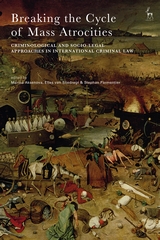Breaking the Cycle of Mass Atrocities Criminological and Socio-Legal Approaches in International Criminal Law
Description
Breaking the Cycle of Mass Atrocities investigates the role of international criminal law at different stages of mass atrocities, shifting away from its narrow understanding solely as an instrument of punishment of those most responsible. The book is premised on the idea that there are distinct phases of collective violence, and international criminal law contributes in one way or another to each phase. The authors therefore explore various possibilities for international criminal law to be of assistance in breaking the vicious cycle at its different junctures.
Marina Aksenova
Marina Aksenova is a lawyer specialising in international criminal and comparative criminal law. Marina graduated with honors from the International University in Moscow. She holds an LLM in Public International Law from the University of Amsterdam and an MSc in Criminal Justice and Criminology from the University of Oxford. Marina defended her PhD entitled ‘Complicity in International Criminal Law’ in 2014 at the European University Institute, in Florence. Prior to joining the IE, Marina was as a postdoctoral research fellow at the Centre of Excellence for International Courts (iCourts), Faculty of Law, University of Copenhagen.
Marina has a broad range of research interests. She studies purposes of international criminal law, focusing in particular on the overarching symbolic objective of the discipline. She is also interested in the process of criminalization within the field of international criminal justice. In this regard, Marina looks closely at the offence of international terrorism. Marina also publishes in the fields of human rights law, public international law and transitional justice. Finally, Marina is developing a new field of academic study – the criminology of mass atrocities.



